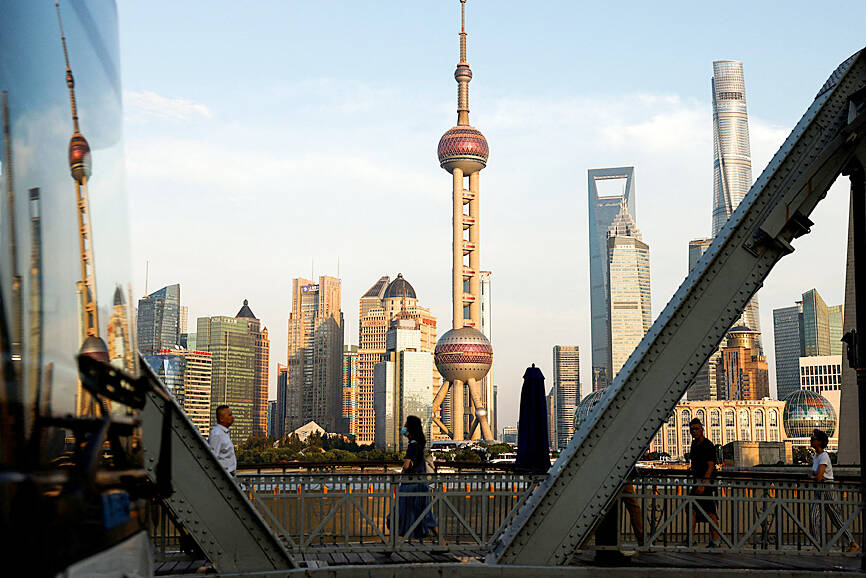Chinese policymakers plan to sell a record 3 trillion yuan (US$411.1 billion) of special treasury bonds next year, as the government seeks to boost the slowing economy, Reuters reported yesterday.
Funds raised from the bonds would be used to support consumption subsidies, business equipment upgrades, and investments in key technology and advanced manufacturing sectors, according to Reuters, which cited two unnamed sources.
Some of the proceeds would also be used to inject capital into large state banks, it said.

Photo: Reuters
Greater fiscal stimulus would help the world’s second-largest economy buffer against expected headwinds from the administration of US president-elect Donald Trump, which has threatened to impose steep tariffs on Chinese imports.
China’s CSI 300 equity benchmark gained about 1 percent after the report, before paring gains. Chinese government bonds extended losses, with the 10-year yield rising four basis points to 1.72 percent from a record-low close in the previous session.
China’s special sovereign bonds are issued for specific purposes — such as financing COVID-19 pandemic-related spending — and therefore are not counted toward the headline budget deficit. The size of the potential bond sales would exceed the 1 trillion yuan sold this year and become the highest on record.
“It’s bigger than our expectations and shows the government’s willingness to shore up growth through a more sizable fiscal stimulus,” Societe Generale SA China economist Michelle Lam (林雪潔) said.
About 1.3 trillion yuan of the funds to be raised would be used to support a consumer product and business equipment trade-in program, as well as major construction projects, Reuters said.
Apart from that, more than 1 trillion yuan would be used to invest in “new productive forces,” which stand for advanced manufacturing sectors such as electric vehicles, Reuters reported.
The rest of the funds would be used to recapitalize large state banks as their profit margins are narrowing, it said.
China would “expand the magnitude of fiscal spending and accelerate the spending pace,” the Chinese Ministry of Finance said yesterday in a statement following a two-day national conference on fiscal work next year.

TAKING STOCK: A Taiwanese cookware firm in Vietnam urged customers to assess inventory or place orders early so shipments can reach the US while tariffs are paused Taiwanese businesses in Vietnam are exploring alternatives after the White House imposed a 46 percent import duty on Vietnamese goods, following US President Donald Trump’s announcement of “reciprocal” tariffs on the US’ trading partners. Lo Shih-liang (羅世良), chairman of Brico Industry Co (裕茂工業), a Taiwanese company that manufactures cast iron cookware and stove components in Vietnam, said that more than 40 percent of his business was tied to the US market, describing the constant US policy shifts as an emotional roller coaster. “I work during the day and stay up all night watching the news. I’ve been following US news until 3am

UNCERTAINTY: Innolux activated a stringent supply chain management mechanism, as it did during the COVID-19 pandemic, to ensure optimal inventory levels for customers Flat-panel display makers AUO Corp (友達) and Innolux Corp (群創) yesterday said that about 12 to 20 percent of their display business is at risk of potential US tariffs and that they would relocate production or shipment destinations to mitigate the levies’ effects. US tariffs would have a direct impact of US$200 million on AUO’s revenue, company chairman Paul Peng (彭雙浪) told reporters on the sidelines of the Touch Taiwan trade show in Taipei yesterday. That would make up about 12 percent of the company’s overall revenue. To cope with the tariff uncertainty, AUO plans to allocate its production to manufacturing facilities in

COLLABORATION: Given Taiwan’s key position in global supply chains, the US firm is discussing strategies with local partners and clients to deal with global uncertainties Advanced Micro Devices Inc (AMD) yesterday said it is meeting with local ecosystem partners, including Taiwan Semiconductor Manufacturing Co (TSMC, 台積電), to discuss strategies, including long-term manufacturing, to navigate uncertainties such as US tariffs, as Taiwan occupies an important position in global supply chains. AMD chief executive officer Lisa Su (蘇姿丰) told reporters that Taiwan is an important part of the chip designer’s ecosystem and she is discussing with partners and customers in Taiwan to forge strong collaborations on different areas during this critical period. AMD has just become the first artificial-intelligence (AI) server chip customer of TSMC to utilize its advanced

Six years ago, LVMH’s billionaire CEO Bernard Arnault and US President Donald Trump cut the blue ribbon on a factory in rural Texas that would make designer handbags for Louis Vuitton, one of the world’s best-known luxury brands. However, since the high-profile opening, the factory has faced a host of problems limiting production, 11 former Louis Vuitton employees said. The site has consistently ranked among the worst-performing for Louis Vuitton globally, “significantly” underperforming other facilities, said three former Louis Vuitton workers and a senior industry source, who cited internal rankings shared with staff. The plant’s problems — which have not